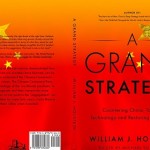The following is an excerpt from the book titled ‘A Grand Strategy: Countering China, Taming Technology and Restoring the Media’ – written by William J. Holstein, published by Brick Tower Press.
For more than three decades, it was credible to believe that American companies could make money in China, and that the Communist system would evolve toward greater pluralism. Further, Beijing would become a “responsible stakeholder” in the world order created by America and its allies. The goals seemed compatible.
What has changed the equation is that Xi has imposed sweeping authoritarian rule at home while engaging in far more aggressive tactics in Hong Kong, Taiwan, the South China Sea, Australia, and inside the United States. The discovery that one thousand Chinese researchers inside the United States were apparently working secretly for the People’s Liberation Army is merely the latest case in point.
Suddenly, there is stark conflict between traditional American goals vis-à-vis China and the role American CEOs are playing. A new book, China’s Quest for Foreign Technology: Beyond Espionage, edited by William C. Hannas and Didi Kirsten Tatlow, explains how Microsoft has played a major role in training the leadership of China’s artificial intelligence push at institutes in China. “It raises the question of what contribution the company’s new China-based AI facilities will make toward U.S. security and prosperity,” Hannas, formerly of the Central Intelligence Agency, writes.
The book and other published reports have also spotlighted how Intel, Nvidia, Seagate, and Western Digital have fueled the rise of China’s Hikvision and Dahua, the world’s largest players in the use of AI in facial recognition systems used to repress China’s Uighur population but also being sold around the world.
American semiconductor makers and designers such as Qualcomm are coming under pressure for sales that end up in the hands of the People’s Liberation Army. Thermo Fisher has been reported to be selling DNA-testing equipment to Chinese police, who have used it to build up an enormous DNA database of Chinese men as a tool of surveillance. Apple, under pressure from Beijing, removed an app from its App Store that pro-democracy protestors in Hong Kong were using. Apple, for all intents and purposes, is a Chinese company, despite the fact that its headquarters is in California—it is so dependent on its manufacturing base in China that it dare not offend Chinese authorities, who could disrupt its supply chain or create endless complications in the ability of its main subcontractor, Foxconn, to assemble iPhones. “The CEOs of America’s leading tech companies tend to be more concerned about what Beijing wants than what America needs,” says Clyde Prestowitz, the veteran trade negotiator and author of The World Turned Upside Down: America, China and the Struggle for Global Supremacy.
As these revelations have come to light, American CEOs have maintained a code of silence about whether they bear any responsibility for how their products are used in China. And at home, national security is the government’s problem, in their view.
The federal government will need to find a way to have deeply important conversations with tech CEOs, because they will inevitably be key to any real effort to moderate China’s technological gains and help American technologies to either catch up or remain ahead. And they will be essential players if America is to find the will to harden its Information Technology systems and interrupt a pattern of deep and consistent Chinese penetration.
William Holstein is a Journalist and has authored A Grand Strategy: Countering China, Taming Technology and Restoring the Media, among other books.
This is an excerpt from the book titled ‘A Grand Strategy: Countering China, Taming Technology and Restoring the Media’, published by Brick Tower Press.
For more information regarding this book, click here.
You can read exclusive content from Gateway House: Indian Council on Global Relations, here.


